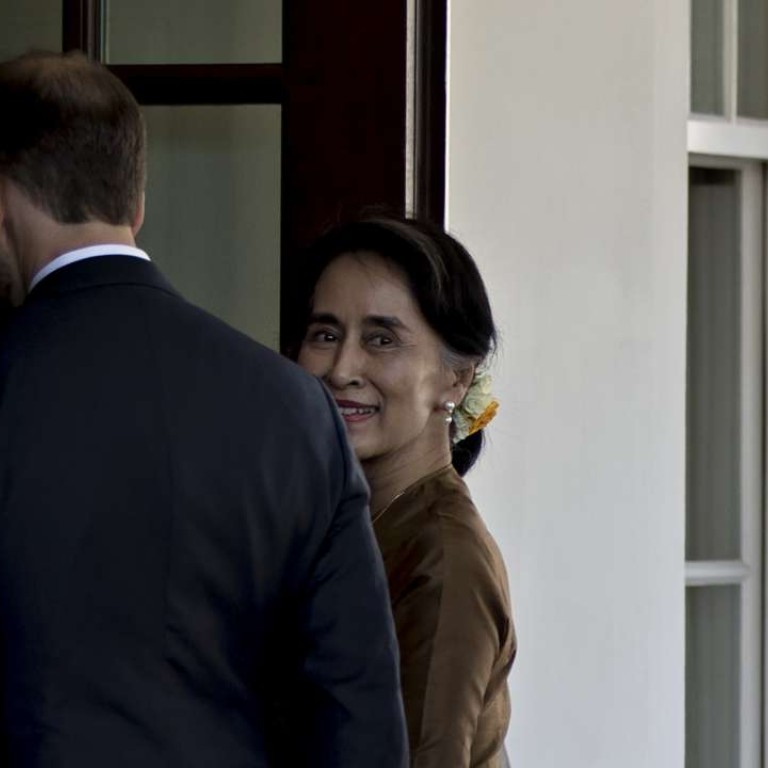
Update | Obama says US ready to lift Myanmar sanctions as Aung San Suu Kyi visits Washington
Myanmar’s Aung San Suu Kyi called on Wednesday for the lifting of economic sanctions against her country and President Barack Obama, in their first White House meeting since she became her country’s leader, said the United States was ready to do so.
“It is the right thing to do in order to ensure that the people of Burma see rewards from a new way of doing business and a new government,” Obama said with Suu Kyi sitting next to him in the Oval Office.
The trip by Suu Kyi, who like Obama is a Nobel Peace Prize laureate, capped a decades-long journey from political prisoner to national leader after her party won a sweeping electoral victory last year.

With Suu Kyi no longer an opposition figure, the United States has been weighing a further easing of sanctions against Myanmar, formerly known as Burma, as Obama looks to normalise relations with a country Washington shunned when it was ruled by a military junta.
“We think that the time has now come to remove all the sanctions that hurt us economically,” Suu Kyi said, noting that the US Congress had supported her country by backing sanctions in the past to put pressure for democratic reforms.
As Suu Kyi arrived for the meeting, the White House issued a statement saying it would reinstate Myanmar to the Generalized System of Preferences (GSP), which provides duty-free treatment for goods from poor and developing countries.
Myanmar was removed from GSP benefits in 1989 following pro-democracy uprisings a year earlier that were brutally suppressed by the ruling military junta. Myanmar will be back in the program on November 13, US officials said.
Suu Kyi’s visit to the White House signals another significant step in Burma’s international rehabilitation and her transition from democratic idol to politician.
The White House is keen to reinforce Suu Kyi’s primacy as the de facto head of the government of Myanmar.
Officially she is foreign minister and self-appointed state counsellor -- a role akin to prime minister.
In public there will be lofty rhetoric about freedom, peace and transition.
But private talks between Obama and Suu Kyi are likely to focus on the nuts and bolts of governing.
After spending much of the last few decades under arrest, she presides over a skeletal government, an economy hollowed out by decades of kleptocratic dictatorship and a country riven with ethnic and religious violence.
The veteran campaigner must tackle all those problems while keeping an eye on the generals, lest they have second thoughts about reform.

Since her election, Suu Kyi has shocked some of her more zealous Western supporters by following the junta’s lead, most notably by refusing to recognise the Rohingya -- a persecuted Muslim minority group in the overwhelmingly Buddhist country.
Tens of thousands of stateless Rohingya have spent the past four years trapped in bleak displacement camps with limited access to health care and other basic services.
A group of 46 non-governmental organisations circulated a letter they wrote to Obama on Monday expressing concern about easing sanctions on Myanmar while human rights abuses by the military and against Rohingya Muslims persisted.
“To lift sanctions prior to tangible change for suffering communities would be a disservice to those vulnerable peoples who deserve international protection,” it said.
Privately, US officials acknowledge Suu Kyi is working with some very tough political constraints and dare not push the military, or the public, too far or too fast.
“She has to tackle problems one by one,” said Ben Rhodes, a key Obama aide who has spearheaded the administration’s Myanmar policy.
The biggest question for the Obama administration is how far and how fast to lift remaining US sanctions.
In May, Washington lifted a host of financial and trade embargoes on state-owned banks and businesses.
The move on Wednesday to let Myanmar back in to the Generalized System of Preferences is likely to have a significant, but limited economic impact.
But Obama has stopped short of rescinding an executive order that declares Myanmar a “national emergency” and underpins broader sanctions.
Scrapping that order would bring clarity to US firms thinking about doing business in Burma, helping the economy and with it Suu Kyi’s government.
But it could also weaken US leverage and perhaps let the military off the hook.

A full scrapping of sanctions is only likely to come when the constitution is changed to allow civilian control of the military and rules that guaranteed a quarter of legislative seats of officers.
For now the White House is happy to follow Suu Kyi’s lead.
“We’ll want to hear from her directly about how she is viewing our sanctions regime,” said Rhodes.
That may be tacit acknowledgement that the White House believes Suu Kyi -- like her father, a military officer who steered Burma toward independence from Britain -- can best navigate some perilous political shoals.
“It has been interesting to watch the transition that she has made from an icon to a politician, a democratically elected leader of a country,” said Rhodes.

.png?itok=arIb17P0)
